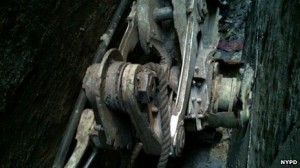“Do you want to get well?”
The whole story swings on that sentence. The story I’m speaking of is Jesus’ encounter with the man at the pool at Bethesda.
Soon another Feast came around and Jesus was back in Jerusalem. Near the Sheep Gate in Jerusalem there was a pool, in Hebrew called Bethesda, with five alcoves. Hundreds of sick people—blind, crippled, paralyzed—were in these alcoves. One man had been an invalid there for thirty-eight years. When Jesus saw him stretched out by the pool and knew how long he had been there, he said, “Do you want to get well?”
The sick man said, “Sir, when the water is stirred, I don’t have anybody to put me in the pool. By the time I get there, somebody else is already in.”Jesus said, “Get up, take your bedroll, start walking.” The man was healed on the spot. He picked up his bedroll and walked off. (John 5:1-9, The Message)
At different times in my life, both the question and the story have struck me in different ways. As a kid, I wondered why the guy didn’t just camp out on the edge of the pool and take a dive at the first hint of a ripple. In seminary, thanks to my pastoral care classes and then CPE, I heard the question with a more therapeutic bent, as if Jesus were asking, “What is blocking you from finding your healing?” I found a kinder eye in the midst of my years of depression because I understood the man’s sense of helplessness in a way I had not before. Yesterday, as Ginger was preaching from the story (which I have not read in a while), it struck me, whatever Jesus’ intent, the man didn’t answer the question. (About the time I wrote that down in my notebook, Ginger said it out loud in her sermon.) Jesus asks if he wants to get well and the man responds by saying he has no one to help him into the water.
For all of John’s wordiness in his gospel, he is stingy with the details in this story. The more I think about it, the more I realize how I have filled in the details may not be accurate. John says he had been an invalid for thirty-eight years, but that does not mean the guy was thirty-eight and had been sick all of his life. Perhaps he was older and left disabled by an accident or tragedy or severe illness. I’ve also mostly imagined him at the pool everyday for thirty-eight years, but that’s not clear either. What does seem true is that he had been an invalid for almost four decades and had come to the pool with some regularity. How does someone maintain hope in the midst of such a life for so long? Whatever kept him from the pool, this man had some strength, some faith that kept him coming back to the water, even in the face of almost certain failure.
Though John also tells of the legend about the healing powers of the pool, he doesn’t paint in much of a context for the interaction between Jesus and the man, other than to let us know there were other people there and they kept beating him to the water — and that many of the others had people to help them find their way to healing. But we see no other faces, hear no other voices. Only Jesus and the man:
“Do you want to get well?”
“I’m all alone.”
Jesus’ response is to help him, to stand with him: “Get up and start walking.” Jesus shattered the isolation that shackled the man with his attentiveness and gave the guy the chance to see something other than defeat.
During our call to worship yesterday at Pilgrim, we prayed that God might “save us from our aimlessness;” in our prayer of confession, we repented of our mistrust. In our service, both prayers are read together in unison — a physical reminder that we’re all in this together. Even with the weekly reminder, we can quickly forget and find ourselves feeling like the man at the pool, convinced he was the only one feeling alienated.
I do wonder about the other folks at the pool who must have seen the man there day after day, or week after week. What a difference it would have made for someone — even someone also waiting for the ripples — to say, “You’ve been here so long; let me help you to the water.” More than one healing would have happened.
In our aimlessness and mistrust — no, let me start over. In my aimlessness and mistrust, I have been healed by those who have asked, in their own way, “Do you want to get well” and then helped me up. I, like the man at the pool, couldn’t do it alone. Look around at the pools of people in which you find yourself — church, school, work, coffee shops, bars, shopping malls. REM was right: everybody hurts.
Chances are at Bethesda the man wasn’t the only one who felt alone. The pool might have been ringed with people wishing for someone to help them. Same way at church and school and work and wherever. Most all of us are waiting for someone to ask if we want to get well and then offer to help us up in one way or another. Most of us, too, would do well to look up from our lives and see who needs to be asked. We are both the hurting and the healers. We are all in this together.
Peace,
Milton
